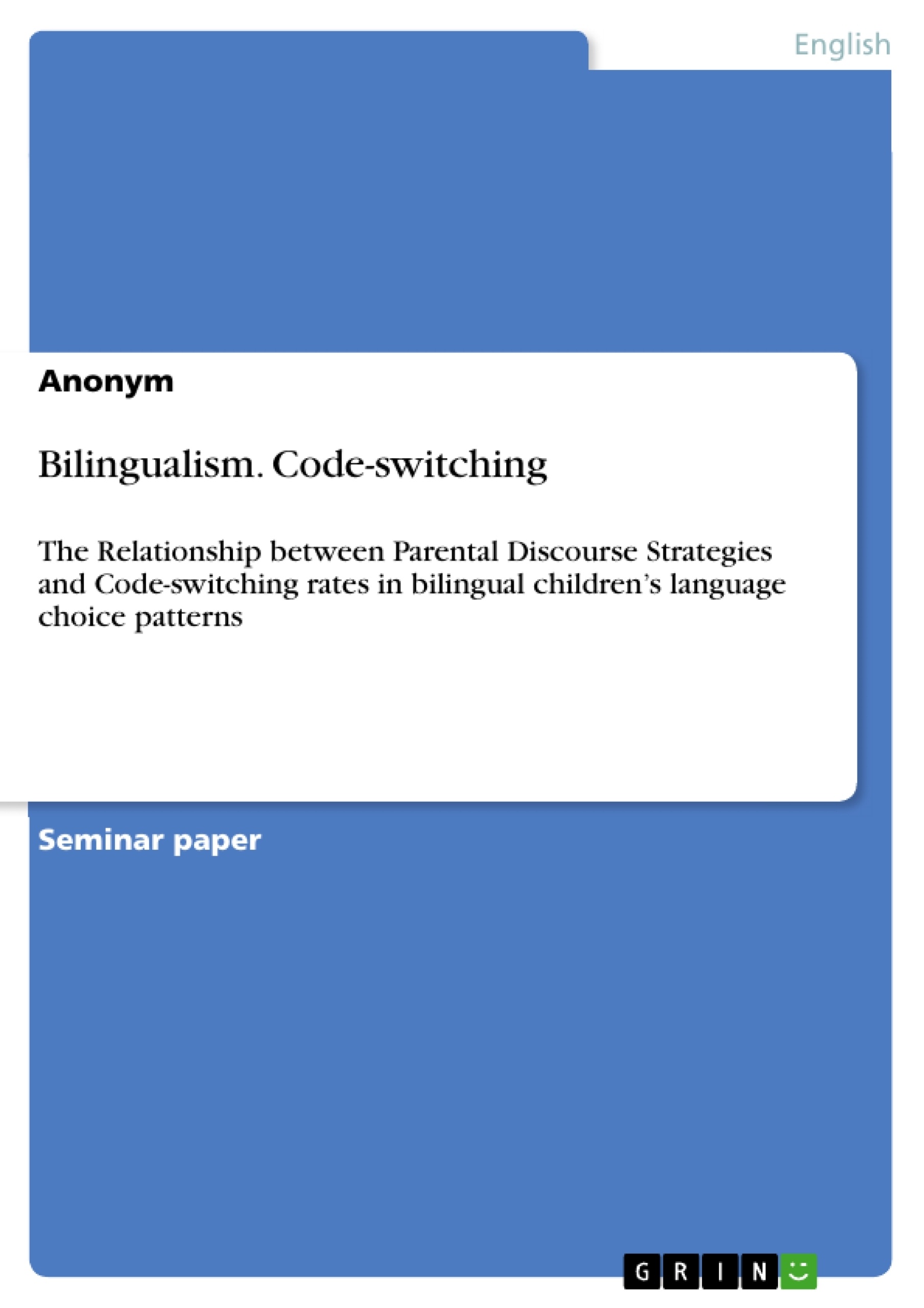In the following paper, I will examine the field of bilingualism in children’s speech production and the phenomenon of code-switching when children speak to a certain interlocutor. More specifically, I am going to focus on bilingual children’s language choice patterns and especially on what influence parents’ responses and reactions to code-switching their children have. Apart from that, I will consider other factors that may affect the choice of language in bilingual children’s parent-directed speech.
Specifying that, within my paper I will scrutinize the question “Do parental discourse strategies influence the language choice of bilingual children?”.
Table of Contents
- Abstract
- Introduction
- Theoretical Background
- Previous Research
- Research Question and Hypothesis
- Studies
- Mishina-Mori: A longitudinal analysis of language choice in bilingual children: The role of parental input and interaction
- Meng and Miyamoto: Input and output in code-switching: A case study of a Japanese-Chinese bilingual infant
- Nicoladis and Genesee: Parental Discourse and Codemixing in Bilingual Children
- Results
- Mishina-Mori: A longitudinal analysis of language choice in bilingual children: The role of parental input and interaction
- Meng and Miyamoto: Input and output in code-switching: A case study of a Japanese-Chinese bilingual infant
- Nicoladis and Genesee: Parental Discourse and Codemixing in Bilingual Children
- Discussion
- Conclusion
- References
- Appendix
Objectives and Key Themes
This paper explores the phenomenon of code-switching in bilingual children, focusing specifically on the influence of parental discourse strategies on children's language choice patterns. It examines the role of parental responses to code-switching and other factors that might impact the choice of language in bilingual children's parent-directed speech.
- The impact of parental discourse strategies on bilingual children's language choices.
- The role of parental input and interaction in shaping language choice patterns in bilingual children.
- Different approaches to bilingualism and definitions of code-switching.
- The influence of language dominance and general linguistic proficiency on code-switching.
- The analysis of three studies investigating the relationship between parental discourse and code-switching.
Chapter Summaries
The paper begins with an introduction outlining the prevalence of bilingualism and the complexities of code-switching in children's speech. It establishes the research question of whether parental discourse strategies influence bilingual children's language choice and introduces the three studies that will be examined. The second chapter delves into the theoretical background of bilingualism and code-switching, providing various definitions and highlighting the multifaceted nature of these concepts. This chapter explores the types of code-switching, such as intra-sentential and inter-sentential code-switching, and introduces two key hypotheses regarding parental influence on code-switching.
The third chapter reviews previous research focusing on parental discourse strategies and the influence of parental input on bilingual children's language development. The fourth chapter states the research question and hypothesis of the paper, exploring the potential impact of parental discourse strategies on bilingual children's language choices. Chapter five presents three studies that investigate the relationship between parental discourse and code-switching in bilingual children, providing details on the methodology and key findings of each study. The sixth chapter summarizes and analyzes the results of the three studies discussed in the previous chapter, drawing connections between their findings and the research question. The seventh chapter discusses the implications of the research findings, exploring the significance of parental discourse strategies in shaping children's language choices. The eighth chapter concludes the paper by summarizing the main findings and offering suggestions for further research.
Keywords
The primary focus of this paper is on bilingualism, code-switching, and the impact of parental discourse strategies on language choice patterns in bilingual children. The study utilizes empirical data from three studies exploring the influence of parental input and interaction on children's language use. Key concepts examined include language dominance, general linguistic proficiency, code-mixing, and the one parent-one language policy. The paper also highlights the multifaceted nature of bilingualism and code-switching, acknowledging the various theoretical frameworks and definitions surrounding these concepts.
- Quote paper
- Anonym (Author), 2022, Bilingualism. Code-switching, Munich, GRIN Verlag, https://www.grin.com/document/1488757




